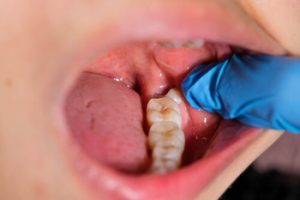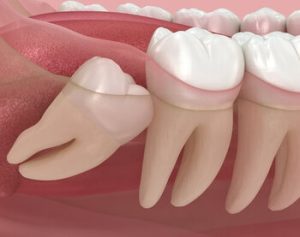Wisdom teeth, also known as third molars, are the last set of adult teeth to emerge. While they often get a bad reputation due to potential complications, such as impacted wisdom teeth and overcrowding, not all wisdom teeth need to be removed. In fact, keeping wisdom teeth intact can offer significant benefits if they are healthy and properly aligned.
Many people are advised to undergo wisdom teeth removal as a preventive measure, but retaining wisdom teeth can be advantageous in certain cases. Understanding wisdom teeth, their function, and their impact on overall oral health is key to making an informed decision about whether to keep them or proceed with extraction.
Understanding Wisdom Teeth: Their Role in Dental Anatomy
Wisdom teeth usually begin to erupt between the ages of 17 and 25, though their timing varies for each individual. These molars are remnants of our evolutionary past when early humans relied on a tougher diet that required more chewing power. With modern diets and advancements in oral hygiene, the necessity of wisdom teeth has diminished, but that does not mean they are entirely useless.
Properly aligned wisdom teeth contribute to chewing efficiency, aiding in grinding and breaking down food. If they fit well within the dental arch and do not interfere with other teeth, they can remain functional without posing risks to general oral health.
Wisdom Teeth Worries: Should You Be Concerned?
Before discussing the benefits of keeping wisdom teeth, it’s important to acknowledge why wisdom teeth removal is often recommended:
- Insufficient Space: Many people do not have enough room in their jaw to accommodate four wisdom teeth, leading to crowding and misalignment of existing teeth.
- Impacted Wisdom Teeth: When wisdom teeth grow at an angle or fail to fully emerge, they can become impacted, leading to wisdom tooth pain and infection.
- Gum Disease and Decay: A partially erupted wisdom tooth can be difficult to clean, making it susceptible to bacterial buildup, food particles, and gum infection.
- Damage to Neighbouring Teeth: In some cases, wisdom teeth press against adjacent teeth, causing damage or shifting the alignment of nearby teeth.
Despite these concerns, wisdom teeth do not always pose problems. With regular dental check-ups and good oral hygiene, it is possible to keep wisdom teeth intact without compromising dental health.
Why Keeping Your Wisdom Teeth Might Be a Smart Choice
If wisdom teeth grow in a healthy and properly aligned manner, they can provide several advantages. Instead of opting for immediate wisdom teeth extraction, individuals should consider these benefits:
1. Preserving Natural Chewing Power and Efficiency
Wisdom teeth contribute to overall chewing efficiency, particularly for grinding tough or fibrous foods. Retaining wisdom teeth can enhance the mouth’s ability to break down food, supporting digestion and nutrient absorption. If wisdom teeth do not disrupt nearby teeth, keeping them can help maintain optimal chewing function.
2. Avoiding Unnecessary Surgical Removal
Removing wisdom teeth is a surgical procedure that comes with potential risks, including infection, nerve damage, significant bleeding, and the development of dry sockets. The recovery period can be uncomfortable, often requiring pain relief and dietary restrictions. If wisdom teeth do not cause discomfort or dental problems, avoiding unnecessary surgical removal reduces these risks.
3. Maintaining Proper Dental Alignment
When wisdom teeth grow correctly, and there is sufficient space, they can help preserve the natural structure of the dental arch. Premature removal of wisdom teeth may lead to shifting of existing teeth, affecting overall dental alignment. Retaining wisdom teeth in cases where they do not cause crowding can support proper alignment and prevent unwanted movement of other teeth.
4. Reducing the Risk of Post-Surgical Complications
Wisdom teeth removal, especially when performed under general anaesthesia, comes with risks such as blood clot formation, nerve injury, and serious infections. Some people experience prolonged wisdom tooth pain or complications during healing, requiring additional follow-up visits. Keeping wisdom teeth, if they do not pose any risks, avoids the need for an extended recovery period.
5. Providing a Natural Tooth Replacement for the Future
In cases where other molars become damaged or require extraction, wisdom teeth can serve as a natural replacement. If a patient loses a molar due to decay or injury, an existing wisdom tooth can shift into place, reducing the need for dental implants or bridges. Retaining wisdom teeth can act as a long-term safeguard for dental health.
6. Preventing Costly Dental Procedures
Wisdom teeth extraction can be expensive, particularly if surgical removal is required. Costs can include general anaesthesia, post-surgical medications, and potential follow-up treatments for complications. If there is no immediate need to remove wisdom teeth, avoiding the procedure can save money and prevent unnecessary dental expenses.
7. Preserving Jawbone Density and Strength
When wisdom teeth are removed, the jawbone in that area can begin to shrink over time due to lack of stimulation. Retaining wisdom teeth helps maintain the integrity of the jawbone and prevents loss of bone density, which can affect the overall structure of the face and bite.
8. Avoiding a Disruptive Recovery Period
The recovery process after wisdom teeth removal often includes swelling, discomfort, and dietary restrictions. Patients must avoid strenuous physical activities, maintain careful oral hygiene, and prevent infection. Keeping wisdom teeth means avoiding these post-surgical challenges and maintaining daily activities without interruption.
When Wisdom Teeth Should Be Removed
Although keeping wisdom teeth has its benefits, there are situations where wisdom teeth removal is the best course of action. Some cases that may require wisdom teeth extraction include:
- Severe Pain and Infection: If wisdom tooth pain becomes persistent or if there are signs of gum infection, removal may be necessary.
- Impacted Wisdom Teeth: When wisdom teeth fail to fully emerge or grow in an abnormal position, they can cause discomfort and future dental issues.
- Overcrowding and Dental Misalignment: If wisdom teeth push against existing teeth, they may disrupt dental alignment, causing long-term dental problems.
- Increased Risk of Decay and Gum Disease: If wisdom teeth are hard to clean due to their position, they may be more susceptible to decay and bacterial buildup.
A dentist’s advice is essential in determining whether to keep or remove wisdom teeth. Regular check-ups and X-rays help assess their position and impact on oral health.
How to Maintain Healthy Wisdom Teeth
For those who choose to keep their wisdom teeth, proper care is crucial. Here are some key steps to ensure healthy wisdom teeth and overall oral hygiene:
1. Regular Dental Check-Ups
Dental professionals can monitor wisdom teeth growth and detect potential issues early. Routine check-ups allow dentists to assess whether the wisdom teeth are causing problems or remain healthy.
2. Thorough Brushing and Flossing
Wisdom teeth are positioned at the back of the mouth, making them more difficult to clean thoroughly. Using a soft-bristled toothbrush and proper flossing techniques ensures food particles do not get trapped, reducing the risk of decay and gum infection.
3. Use of Antibacterial Mouthwash
Rinsing with antibacterial mouthwash helps eliminate bacteria around the wisdom teeth, preventing gum inflammation and serious infections.
4. Monitoring for Signs of Dental Issues
Symptoms such as swelling, discomfort, or difficulty chewing should not be ignored. If wisdom teeth begin to cause problems, seeking professional advice early can prevent further complications.
The Importance of Monitoring Wisdom Teeth Over Time
Even if wisdom teeth are not causing any immediate discomfort, regular monitoring is essential to prevent potential issues in the future. The absence of pain does not necessarily mean they are problem-free. Routine dental check-ups allow dentists to assess their positioning and overall health over time.
Why Regular Check-Ups Matter
Wisdom teeth can remain dormant for years before causing problems. Regular monitoring allows dentists to:
- Identify potential crowding or impaction before symptoms develop.
- Identify the initial indicators of decay, gum disease, or infection surrounding wisdom teeth.
- Assess whether there is sufficient space for them to remain in the jaw.
The Role of X-Rays in Wisdom Teeth Assessment
Dentists use X-rays to evaluate wisdom teeth that have not fully erupted. These scans help identify:
- Whether the wisdom teeth are growing at an angle.
- If they are pressing against adjacent teeth.
- Signs of cysts, infections, or bone loss in the jaw.
Routine dental visits ensure that wisdom teeth remain in good condition and that any potential problems are addressed early.
How Wisdom Teeth Affect Speech and Bite Force
Wisdom teeth play a role in the way the mouth functions, including chewing and speaking. When properly aligned, they contribute to overall bite strength, but their removal may affect these functions in some individuals.
The Role of Wisdom Teeth in Chewing Efficiency
Wisdom teeth serve as additional molars, helping to break down food, particularly harder and fibrous foods. If they are well-positioned, they can enhance chewing power and distribute the biting force more evenly across the dental arch.
Do Wisdom Teeth Affect Speech?
Some people worry that removing wisdom teeth might impact their speech. However, speech is largely influenced by the position of the tongue, teeth alignment, and jaw movement rather than the presence of wisdom teeth. While extraction is unlikely to drastically change speech patterns, wisdom teeth pressing against adjacent teeth may cause slight speech difficulties in rare cases.
Does Removing Wisdom Teeth Weaken the Bite?
For individuals with a strong bite, wisdom teeth can contribute to additional stability. If removed unnecessarily, some patients report changes in their ability to chew efficiently, especially if they already have missing teeth in other areas. However, this is not common and largely depends on individual dental anatomy.
Dietary and Lifestyle Adjustments for Those Keeping Wisdom Teeth
Maintaining healthy wisdom teeth requires proactive care, especially since they are located at the back of the mouth and can be harder to clean. Here are some essential dietary and lifestyle habits to help prevent problems.
Oral Hygiene Tips for Wisdom Teeth
- Brush Thoroughly: Use a soft-bristled toothbrush to clean around wisdom teeth, ensuring food particles do not get trapped.
- Floss Daily: Flossing around wisdom teeth prevents plaque buildup that can lead to gum disease.
- Use an Antibacterial Mouthwash: This helps reduce bacterial buildup and prevents gum infections.
Dietary Adjustments for Better Wisdom Teeth Health
- Avoid Sticky and Sugary Foods: They can get lodged around wisdom teeth, increasing the risk of decay.
- Include Fiber-Rich Foods: This helps naturally clean the teeth and improve gum health.
- Stay Hydrated: Drinking plenty of water helps wash away food particles and bacteria.
By following these hygiene and dietary habits, wisdom teeth can remain healthy and functional.
How to Prepare for a Dental Consultation About Wisdom Teeth
If you are unsure whether to keep or remove your wisdom teeth, a dental consultation is the best way to make an informed decision. Here’s how to prepare for your appointment.
Questions to Ask Your Dentist
- Do my wisdom teeth have enough room to grow properly?
- Are my wisdom teeth affecting neighbouring teeth?
- Do I have any signs of decay or gum disease around my wisdom teeth?
- Would keeping my wisdom teeth impact my overall oral health?
- What are the risks of removing them versus keeping them?
Factors to Consider Before Making a Decision
- Alignment: If wisdom teeth are properly aligned, they may not need removal.
- Pain or Discomfort: If you experience persistent pain, removal may be necessary.
- Gum Health: If wisdom teeth are difficult to clean and prone to infection, extraction might be the best option.
A dentist’s advice, along with regular check-ups, will help determine whether keeping wisdom teeth is the right choice for you.
Wisdom Teeth and Ageing: What to Expect Later in Life
As people age, their dental health changes and wisdom teeth can become a concern later in life.
How Wisdom Teeth Affect Older Adults
- Increased Risk of Decay: If wisdom teeth become harder to clean over time, they may develop cavities.
- Bone Density Changes: Ageing affects jawbone density, which may impact wisdom teeth stability.
- Late-Onset Wisdom Tooth Pain: Even if wisdom teeth were previously problem-free, they may shift slightly and cause discomfort in later years.
Managing Wisdom Teeth as You Age
To prevent future complications:
- Continue routine dental check-ups to monitor wisdom teeth health.
- Maintain excellent oral hygiene to prevent decay and gum disease.
- Seek dental advice promptly if new pain or swelling develops.
While some people may never experience issues with their wisdom teeth, others may require extraction later in life due to age-related dental changes.
Common Myths About Wisdom Teeth
There is a widespread belief that wisdom teeth are nothing but trouble, leading many to think that extraction is inevitable. However, not all wisdom teeth require removal, and keeping them can be beneficial in certain situations. Let’s debunk some of the most common misconceptions surrounding wisdom teeth.
Myth #1: Wisdom Teeth Always Need to Be Extracted
One of the biggest misconceptions is that wisdom teeth removal is mandatory for everyone. While it is true that wisdom teeth can sometimes lead to dental issues, not all wisdom teeth require extraction. If they are properly aligned, have enough room to grow, and do not affect neighbouring teeth, there is no medical necessity to remove them.
Fact: Many people retain their wisdom teeth without any problems. Dental professionals assess wisdom teeth on a case-by-case basis, considering factors such as space in the jaw, alignment, and the patient’s overall oral health.
Myth #2: Keeping Wisdom Teeth Always Leads to Problems
Another misconception is that keeping wisdom teeth will inevitably result in pain, infections, or misalignment of other teeth. While impacted wisdom teeth can cause complications, healthy wisdom teeth do not necessarily pose a threat.
Fact: If wisdom teeth are healthy, fully erupted, and easy to clean, they can function like any other molars without causing dental problems. Regular monitoring by a dentist ensures that they remain healthy.
Myth #3: Wisdom Teeth Extraction is a Simple and Risk-Free Procedure
 Some people believe that wisdom teeth removal is a minor procedure with no downsides. While wisdom teeth extraction is common, it is still a surgical procedure with potential risks such as dry socket, nerve damage, infection, and a prolonged recovery period.
Some people believe that wisdom teeth removal is a minor procedure with no downsides. While wisdom teeth extraction is common, it is still a surgical procedure with potential risks such as dry socket, nerve damage, infection, and a prolonged recovery period.
Fact: Although many extractions go smoothly, surgical removal is not without risks. Patients should weigh the necessity of removal against the potential complications and discuss alternatives with their dentist.
Myth #4: Wisdom Teeth Always Cause Crowding of Other Teeth
A common concern is that wisdom teeth will push existing teeth out of alignment, particularly for those who have had orthodontic treatment.
Fact: While wisdom teeth can contribute to minor shifting in some cases, studies suggest that teeth naturally shift over time, regardless of wisdom teeth. Retaining wisdom teeth does not automatically mean they will cause misalignment, especially if there is enough room for them to grow.
Final Thoughts: Is Keeping Wisdom Teeth the Right Choice?
Wisdom teeth do not always require extraction. If they are well-aligned, have sufficient space to emerge, and do not threaten overall oral health, they can remain intact without complications. The choice should be based on an individual’s dental structure and made in consultation with a dental professional. Before opting for wisdom teeth removal, it is important to weigh the benefits of keeping wisdom teeth against potential risks. Proper oral hygiene, routine dental check-ups, and informed decision-making contribute to optimal oral health, ensuring that wisdom teeth remain a beneficial part of the dental structure rather than a cause for concern.
If you’re unsure whether to keep or remove your wisdom teeth, contact Beyond Infinity Dental today at (02) 8806 3799 to schedule a consultation with our experienced dental team.
Note: Any surgical or invasive procedure carries risks. Before proceeding, you should seek a second opinion from an appropriately qualified health practitioner.
References
- Colgate. (n.d.). What is good oral hygiene? Colgate. Retrieved from https://www.colgate.com/en-us/oral-health/adult-oral-care/what-is-good-oral-hygiene
- Cleveland Clinic. (n.d.). Dental X-rays. Cleveland Clinic. Retrieved from https://my.clevelandclinic.org/health/diagnostics/11199-dental-x-rays
- Healthline. (n.d.). Impacted wisdom tooth. Healthline. Retrieved from https://www.healthline.com/health/impacted-wisdom-tooth
- Mayo Clinic. (n.d.). Cavities: Symptoms & causes. Mayo Clinic. Retrieved from https://www.mayoclinic.org/diseases-conditions/cavities/symptoms-causes/syc-20352892
- Nature. (n.d.). Effects of mouthwash on periodontal pathogens. Nature. Retrieved from https://www.nature.com/articles/s41598-024-53213-x
- WebMD. (n.d.). Wisdom teeth in adults. WebMD. Retrieved from https://www.webmd.com/oral-health/wisdom-teeth-adult









